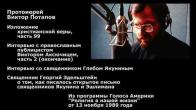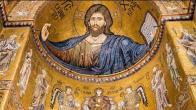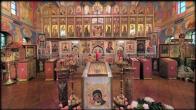ABOUT ORTHODOXY
You are here
The Parable of the Publican and the Pharisee
Continuing to denounce His adversaries, especially the Pharisees, Christ utters a parable that supplements the preceding two - those of the lost sheep and the prodigal son. The following parable - of the publican and the Pharisee - is recorded in the eighteenth chapter of the Gospel according the Luke:
Two men went up into the temple to pray; the one a Pharisee, and the other a publican. The Pharisee stood and prayed thus with himself, God, I thank thee, that I am not as other men are, extortioners, unjust, adulterers, or even as this publican. I fast twice in the week, I give tithes of all that I possess. And the publican, standing afar off, would not lift up so much as his eyes unto heaven, but smote upon his breast, saying, God be merciful to me a sinner. I tell you, this man went down to his house justified rather than the other: for every one that exalteth himself shall be abased; and he that humbleth himself shall be exalted.
Two men went up into the temple to pray, - thus does the Lord begin the parable. In their prayer, Christ discloses the state of both the one and the other. "Prayer is a mirror of one's spiritual disposition", say the holy Fathers of the Church, - "Look into this mirror, look at how thou prayest - and thou wilt be able to say unerringly what thy spiritual disposition is". In prayer, our good and dark sides, our spiritual abasement and spiritual growth are revealed most fully. It is not by chance that "The Lenten Triodion" (the Church book containing all the ivine services, beginning with the Sundays preparatory to Great Lent and ending with Great Saturday) opens with the very significant sticheron: "Brethren, let us not pray as the Pharisee…"
In the parable itself, the Pharisee stands before us as the incarnation of absolute self-satisfaction. The Pharisee - the fulfiller of the law, who observes all the religious rules - comes and prays in thanksgiving: God, I thank thee, that I am not as other men are, extortioners, unjust, adulterers, or even as this publican. I fast twice in the week, I give tithes of all that I possess and here I am coming and thanking Thee.
It must be said that the Pharisee had some grounds for being satisfied with himself. After all, he was a representative of the intellectual stratum of society, he was in his own way religious, educated and well-read; to all appearance, he firmly preserved the religious beliefs and traditions, fulfilled the religious prescriptions, gave a tenth part of his possessions for the needs of his religion. Evidently, being a religious man in his own way, he did nothing obviously evil, and it is entirely possible that, in the worldly sense, he was not a bad man, whom many, perhaps, regarded with great respect.
But the self-satisfaction of the Pharisee was, as it were, the dominate feature of his spiritual state; it was so dominant that it completely obscured from him the genuine picture of what was taking place in his soul. Self-satisfaction, not limited by anything, had seized him to such an extent, that he completely forgot that all his so-called virtues lose all their value and meaning before God's judgment.
But now let us turn to the other - the publican, the tax collector. In the ancient world, this profession was held in general contempt. To all appearance, the publican does not fulfill anything from the law; but, sensing his worthlessness, he only beats his breast and prays: God be merciful to me a sinner! The modest publican concentrated his spiritual powers on his sinfulness, on his imperfectness before the face of God. He understood all the futility of justification by outward works.
These, then, are the two different states - on the one hand, there is the prayer beginning with thanksgiving: God, I thank thee that I am not as other men are. This is seemingly an invocation of God, but in actual fact it is a confirmation of his "ego", for the core of pride, according to Venerable John Climacus, is "the shameless parade of our labours". The Lord, after all, knows the heart of the Pharisee; but he says: I am not as other men are, extortioners, unjust, adulterers, and degrading his neighbor as well - I am not …as this publican.
The Pharisee seemingly both believes in the Lord and loves Him, seemingly seeks His help, but in actual fact degrades his neighbor and shamelessly exalts himself; he is already approaching the greatest degree of pride - rejection of God.
What does he need God for, when he has fulfilled everything and only boasts of his virtues before God. John Climacus writes that the passion of pride "finds food in gratitude". For now, the Pharisee is still praying, but in a little while he will stop praying, because prayer is striving toward God in order to receive help from Him.
"I have seen people", says Venerable John Climacus, "who thank God with their mouth, but mentally magnify themselves. And this is confirmed by that Pharisee who said ironically: O God, I thank Thee."
The self-satisfied Pharisee seriously thinks that he has attained perfection, that he knows everything. He who thinks that there is nothing more for him to learn, will also never learn anything more. Moreover, he is sliding backwards. The Pharisee also slid backwards, and his greatest fall turned out to be that he began to condemn others. Then love inevitably dries up in him, and in its place condemnation of others and contempt for them appear. Self-satisfaction blinds and forces one to be satisfied with little; it makes a man to be morally a minimalist, who is satisfied with his easy outward successes and thinks about the quantity, and not the quality, of his good works. And so the Pharisee also cites figures: I fast twice in the week, I give tithes…
God does not need these calculations. He needs our heart. To think about the quantity of good works leads to legalism, to formalism. All this was characteristic of those who belonged to the sect of the Pharisees. The Lord says, That except your righteousness shall exceed the righteousness of the scribes and Pharisees, ye shall in no case enter into the kingdom of heaven (Matthew 5:20). It is important to note here the Saviour's words except your righteousness shall exceed. With these words, the Lord points out the limitedness of the Pharisees and of their approach to spiritual life.
But there is also another approach. Abba Antony once said to Abba Poemen: "A man's work consists of laying his sins on his own head before God". This is the approach to God of one who needs Him in order to cleanse his sins. Therefore, the publican also prays: God, be merciful to me a sinner. He needs God; he begs, understanding that he has not yet done anything; he also does not proclaim the virtues that he perhaps possesses; he does not lay them, but "his sins on his own head before God".
"Pride is the annihilation of virtue", says John Climacus. In ancient books and in old popular prints one may encounter a depiction of the publican and the Pharisee. The Pharisee is depicted racing along in a chariot, and the publican, walking on foot - they both are striving toward the Kingdom of Heaven. The Pharisee races along in the chariot and hopes to arrive at the Kingdom of Heaven in it. His chariot is furnished with everything necessary for attaining this end; but at the last moment it breaks down, and we see in the ancient pictures that the publican on foot overtakes him.
For real spiritual life one must train oneself to maintain a balance between the manifestations of inward and outward religiosity. It is essential to keep the law - the commandments of God and the regulations of the Church. But this is not enough. If we began to work for the Lord in this way, then in this work we would be like a man, who, according to the words of Climacus, thinks to swim out of the deep using one hand. It is necessary to possess the humility of the publican as well.
It is necessary to hate the exaltation of the Pharisee and the fall of the publican. The publican went out from the temple more justified; but this does not yet mean that he is in the Kingdom of Heaven. Ephraim the Syrian, the teacher of repentance, the author of the Great-Lenten prayer "O Lord and Master of my life", commands us in this prayer to see our own transgressions, and not to judge our brother.
Prayer and good works are in vain if they are performed not for God, but for the world, for our vainglory. Every good work done for show is vain.
According to the unanimous definition of the Fathers of the Church, vainglory is fundamentally "trust in one's own efforts", "a rejection of God", "a driving away of His help". For, in doing something for show, I do it not at all in order to render to God what is due, to return the talent to Him multiplied - this is Thine - but in order that men would praise me. By this, I only assert my own "ego", for I need men here only so that they might render me praise. This is a "visible" idol, according to the definition of the Holy Fathers. I am not serving God here, but men; but I am also serving them not for their sake, but for my own. The Pharisee already rejects God. He comes to the temple and says: I thank thee, that I am not as other men are, extortioners, unjust, adulterers, or even as this publican. I fast twice in the week, I give tithes of all that I possess. Therefore, I am good. Thou didst create me; I still thank Thee. Perhaps Thy help is still needed by the publican, but not by me. I still worship Thee, but Thou art no longer necessary for me. This is the attitude of a man who puts his "ego", his virtue at the head of his life.
The Pharisee fulfills the law, and the law is difficult, for it is not easy to follow all the prescriptions of the law, even if only that of the Old Testament; but this is in vain, for he has no humility.
The devil met a certain Holy Father and said to him: "I am like thee in all things, except one: thou dost not sleep, and I keep vigil; thou fastest, and I eat nothing; but thou vanquishest me with humility". The faithful followers of Christ are known, not by works, but by humility. I can feed someone in God's name, not ascribing anything to myself - and in this instance I shall have done a truly Christian work. However, if I should do the same thing, but for any other reason, for any other aim -whatever it might be - this work will not be Christ's…
The parable of the publican and the Pharisee is Christ's call to think and to uproot the Pharisaism that lives in each of us. The Church hastens to our aid. On the first Sunday preparatory to Great Lent, the Church says to us in Her Divine services: Come, learn from both the Pharisee and from the publican. From the one learn his works, but by no means his pride; for the work by itself means nothing and does not save. But remember that the publican also is not yet saved, but is only more justified before God than the Pharisee, who was adorned with virtues.
Let us firmly remember Christ's words: Every one that exalteth himself shall be abased; and he that humbleth himself shall be exalted (Luke 18:14).
©V. Potapov
Relics in cathedral - monthly calendar
| S | M | T | W | T | F | S |
|---|---|---|---|---|---|---|
|
|
|
|
1
|
2
|
3
|
4
|
|
5
|
6
|
7
|
8
|
9
|
10
|
11
|
|
12
|
13
|
14
|
15
|
16
|
17
|
18
|
|
19
|
20
|
21
|
22
|
23
|
24
|
25
|
|
26
|
27
|
28
|
29
|
30
|
31
|
|
PARISH LIFE
Address of our Cathedral
While all the materials on this site are copyrighted, you may use them freely as long as you treat them
with respect and provide attribution on the Russian Orthodox Cathedral of St.John the Baptist of Washington DC.









